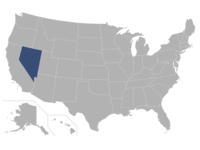Nevada bill to protect abortion patients from prosecution elsewhere heads to governor’s desk

People traveling to Nevada for abortions may soon have an added layer of protection against any draconian attempts to prosecute them for that choice, if a bill passed Monday by the legislature is signed by Gov. Joe Lombardo.
The first-term Republican governor now has five days to sign or veto Senate Bill 131, which would prohibit the State of Nevada from assisting in the arrest or extradition of someone charged in another state for a crime related to reproductive health care services such as abortion, unless that crime is also a crime in Nevada. Abortion is legal in Nevada up to 24 weeks in pregnancy and beyond if the life of the mother is in jeopardy.
If Lombardo takes no action, the bill will automatically become law.
The bill also bars occupational boards from disciplining or disqualifying a medical provider because they have provided abortions or other reproductive health care services. SB 131 was spearheaded by Senate Majority Leader Nicole Cannizzaro, who on Saturday gave birth to her second child.
Shortly after the overturning of Roe v. Wade last June, Nevada abortion providers began reporting seeing more out-of-state patients, and anti-abortion rights advocates began pushing to expand abortion bans to include criminalizing traveling out of state for an abortion.
Lombardo in a February interview with KNPR said any “changes in totality of the abortion question needs to be a vote of the people” but said of not cooperating with other states in their efforts to prosecute Nevada patients that “this particular item involving abortions, I could support if it stands on its own.”
SB 131 also instructs boards to consider the feasibility of reciprocal licensing for reproductive health providers from other states.
Lombardo on the gubernatorial campaign trail floundered on the issue of abortion rights, at one point saying he would rescind a Democratic Gov. Steve Sisolak executive order that did what SB 131 would, then later saying he would keep that executive order in place until the legislature took action.
That legislative action happened Monday, when the Assembly joined the Senate and passed SB 131. The 27-14 Assembly vote fell along party lines, with all Republicans opposing and one Democrat excused.
In the Senate, which passed the bill on April 19, Republican state Sens. Heidi Seevers Gansert and Carrie Buck voted with Democrats to pass the bill 15-6.
Abortion rights groups like NARAL Pro Choice America and Planned Parenthood have already released statements urging Lombardo to make good on his statement of support.
“Protections for our abortion providers and the patients who come to our state seeking care are a vitally important step in acknowledging the present national abortion access landscape and Nevada’s role as a safe haven state,” said Lindsey Harmon, executive director of Planned Parenthood Votes Nevada, in a statement.
As of Monday, Lombardo has signed just nine bills and vetoed three. The trio of vetoed bills related to gun control. Each passed the legislature on party lines. One of the three bills, Senate Bill 171, which would bar people convicted of hate crimes from owning a firearm, has been reintroduced by the legislature and flagged for ‘special order of business’ on May 29.
Proposed constitutional amendment
Democrats this legislative session also passed Senate Joint Resolution 7, a proposal to amend the state constitution to establish a “fundamental right to reproductive freedom,” which is described as encompassing not just abortion but also prenatal and postnatal care, birth control, and infertility care, among others.
The resolution passed the Senate 13-8 on April 17 and the Assembly 28-14 on May 10. Both votes were on strict party lines. Resolutions are not subject to gubernatorial vetoes.
SJR 7 will return to the legislature in 2025 for a second approval. If lawmakers pass it again, it will appear before voters to decide during the 2026 general election.
Nevadans in 1990 through a referendum established the right to an abortion up to 24 weeks of pregnancy and beyond that if necessary to preserve the life of the mother. That right is largely protected from legislative action because the referendum was written so that it could only be changed through a direct vote of the people. But Democrats argue the constitutional amendment would provide the highest level of legal protections and expand protections beyond abortion into areas like birth control that are also under attack in conservative states.








